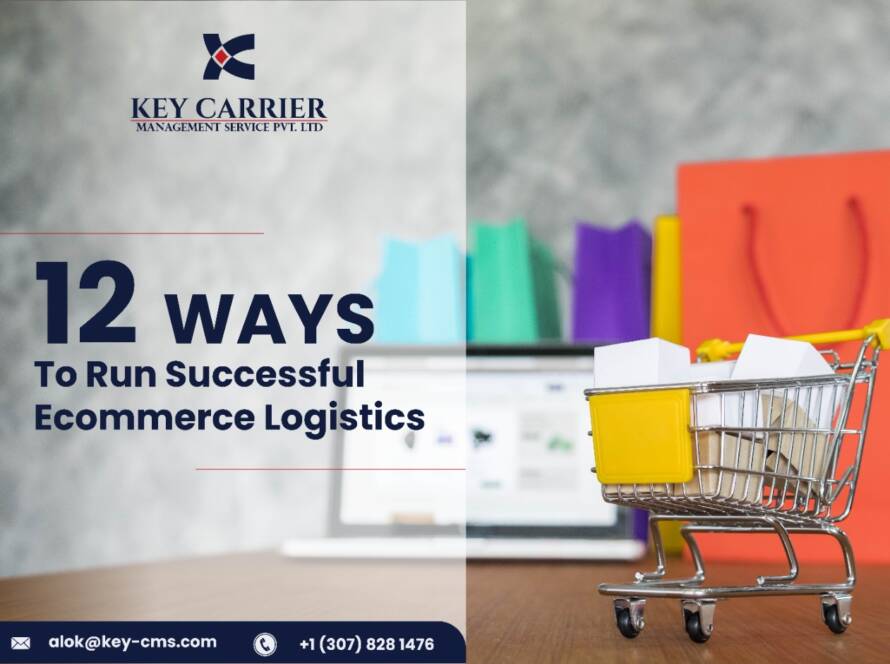

Logistics is the procedure of stocking resources and shipping them to their ultimate destination. It is a back-end supply management and it is integral for the prosperity of your E-commerce.
Logistics of your business is very important and it holds the capacity to make or break your business.
E-commerce logistics is more complex than it initially meets the eye. In an E-commerce business, logistics involves warehousing, observing tracking and security, shipping, profitability, packaging, and the list goes on.
From that, it is clear that E-commerce is rapidly gaining ground in the latest market and a successful E-commerce logistics management is what will set you apart from the others.
To manage and oversee E-commerce logistics along with maintaining cost efficiency, logistics managers need to be aware of and recognize the hurdles in E-commerce logistics management and a few tips to simplify as well as increase the efficiency of the process.
The evolution of logistics from traditional to E-commerce logistics.
With time, the national and global markets witnessed the revolution of traditional methods of distribution. Both of these logistics models coexist, yet they are different in various aspects.
While the traditional logistics framework focuses on the consolidation of goods, E-commerce logistics are concerned with packaging and small loading. E-commerce logistics are difficult to predict and not as stable as traditional logistics frameworks.
Therefore, E-commerce logistics is indeed a challenge for marketers.
In order to maintain and regulate efficiency and affordability, logistics marketers need to identify the challenges posed by E-commerce logistics.
The challenges to e-commerce logistics.
The challenges of managing e-commerce logistics are almost similar to the challenges of traditional logistics frameworks but come with an extra emphasis on speed of order approval and delivery, along with thorough, rapid management of reverse logistics.
This occurs due to the higher rate of returns that is associated with e-commerce.
The massive challenge in e-commerce logistics is tackling the demand for additional high-speed delivery options and next-day shipping, if not same-day shipping.
When it comes to e-commerce logistics, there is constant flooding of orders instead of having periods of ups and downs.
The success or failure of your business will be determined by being able to integrate incoming pick tickets into existing picking strategies.
Demands of a successful E-commerce logistics management.
Every successful e-commerce logistics management takes special care of certain aspects of their logistics business.
Here’s a list of what is expected of your e-commerce logistics business :
1. Customer Satisfaction
In e-commerce logistics, customer satisfaction is a centre of importance.
Customer demands are elevated in logistics and meeting those demands within time, along with being easily approachable sets you apart from the rest.
It is very important in the competitive market to face the high demands of your e-commerce logistics and manage them fruitfully.
2. Stock control and management
Having a good stock of high-quality products is expected of a good logistics company.
Proper maintenance of accurate stock data is an important aspect of the e-commerce logistics business.
It is expected that your company will be able to handle even larger orders quickly since you work together as a group.
3. Order approval and robust operation
Order packing and preparation is a hectic process.
To improve your overall logistics business, you need to have a faster rate of order activation and delivery within time.
4. Fast delivery
Robust and easy deployment of your product is what your customers love.
Your customers expect to have their goods around at the earliest and with the fastest methods and technologies of e-commerce logistics.
You might be late in delivering your product due to huge daytime delivery and high fuel consumption.
All you need to do is to effectively manage your delivery options and routes to give the best solutions.
Having listed all the demands from e-commerce logistics, let’s now understand how to deal with and manage all these demands to promote your e-commerce logistics to be successful.
12 ways to run successful E-commerce logistics.
Want to excel with your e-commerce logistics business, meet and deal with all the challenges? Not to worry! Here’s a list of 12 pointers to run successful e-commerce logistics.
1. Excellent customer service
Never overlook the customer satisfaction part of your business, your customers are the pillars of your e-commerce logistics and need to be treated with attention and accurate information.
2. Real-time information
Make sure that your customers get real-time information and updates about their products, placement and shipment. In other words, maintain transparency and traceability.
3. Automated data backup
Make sure that your stock data is backed up properly to avoid data loss and management errors.
4. Agile warehousing
Maintain your stock warehouse properly with strategic operations and potent functionalities.
5. Flexible order processing
Ensure that your e-commerce logistics are equipped with the best software for effective management of incoming orders and organizing them using proper planning and scheming.
6. Automated systems
To keep your e-commerce logistics in pace with emerging companies and to help reduce manual labour, replace them with easy automation software which also improves accuracy.
7. Optimized stock organization scheme
Oversee and categories your stocks serially and classify them according to various marketing criteria to improve the robustness of your logistics sale.
8. Speed delivery
Enable fast delivery of your products to guarantee customer satisfaction and encourage positive reports.
9. Route management
Speeding up your delivery can be achieved by effective route management, segregating orders based on customer delivery points and chalking out plans with the delivery branch.
10. Determining reverse logistics
By integrating reverse logistics into your systems, you will be able to understand location management and combine them with product distribution.
11. Inferring reasons for return
Trying to deduce why your products are being returned is a way to improve your standards of product quality or other reasons that might be the cause of return.
12. Quick and groundbreaking solutions.
Finding quick solutions to sudden issues and effective risk management can take your e-commerce logistics to great heights.
Key-CMS, one solution to many problems!
That’s all about how to improve and excel in e-commerce logistics. All you need to do is to take care of the sensitive aspects of your project.
But that is quite a task, isn’t it?
Why take the risk of burdening your e-commerce company with logistics? Solution? Outsource your logistics!
Hand over the logistics department of your e-commerce company to trusted sources for bringing out the best results in logistics without straining your business!
Don’t worry about finding logistics outsourcing companies who are reliable and efficient in their work since Key-CMS is here! We are an active outsourcing company providing efficient and trusted services to loads of successful companies over decades.
All your logistics work will be handled by us with the utmost care along with maintaining customer satisfaction. We are known for our ground-breaking schemes in logistics outsourcing, making us one of the leading companies with a satisfied client base.
Whenever you decide to outsource your e-commerce logistics, remember that Key-CMS is just one call away!
Want Grow Your Business and Increase ROI? Start today!Contact Us!Let's chat!




